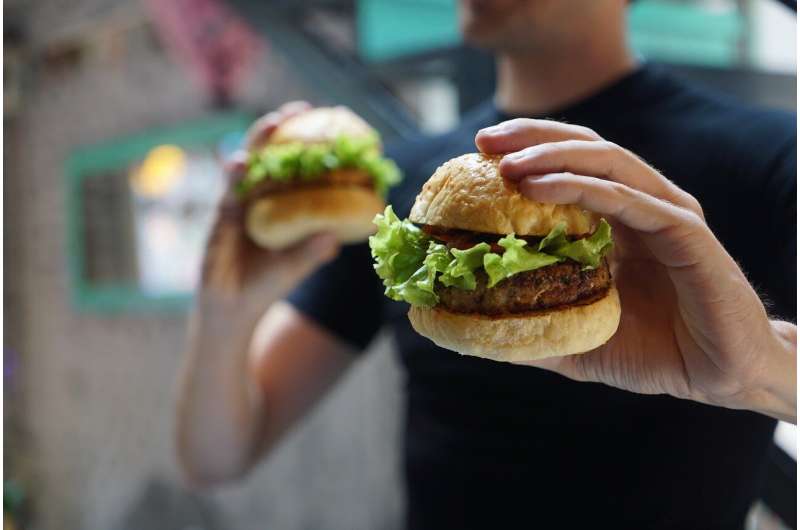December 7, 2023 report
This article has been reviewed according to Science X's editorial process and policies. Editors have highlighted the following attributes while ensuring the content's credibility:
fact-checked
peer-reviewed publication
trusted source
proofread
Using protein-glutaminase treatment to make veggie-burgers more moist

A trio of food scientists at Amano Enzyme Inc. Innovation Center, in Japan, has found that adding a protein-glutaminase treatment to plant-based meat alternatives can make the resulting product juicier. In their study, reported in PLOS ONE, Kiyota SakaiI, Masamichı´ Okada, and Shotaro Yamaguchi, tried several approaches to improving the juiciness of textured vegetable proteins before settling on protein-glutaminase, which is known more commonly as EC 3.5.1.44.
Food scientists have been trying for several years to create a plant-based material that has roughly the same taste, texture and juiciness as real meat—most particularly, hamburger. But such qualities of real meat have proven difficult to mimic. Currently, most such products rely on highly saturated oils to give plant-based meat-like products their taste. But the products have a widely known beany off-flavor.
Protein-glutaminase is an enzyme that has been found to interact with glutamine in a unique way—it converts parts of it into glutamic acid—an interaction that is already used to convert ammonia into other substances. But because it only changes part of the proteins it interacts with, it leaves other parts unaffected. In food, that means it leaves the taste unchanged. It was this factor that led the researchers to test its impact on plant-based meat alternatives.
Testing involved creating hamburger-type patties and then grilling them in the traditional way and tasting them. They found the results to be juicer than those left untreated. They also found another positive attribute—the treated faux burgers also had less of the beany off-flavor.
The researchers also tested the treated burgers more directly by measuring their liquid-holding capacities and found that protein-glutaminase treatment did indeed allow them to retain more liquid. They used electron microscopy to better understand how the protein-glutaminase allowed the burger to hold more liquid—it allowed for freeing amino nitrogen.
More testing is required before the process can be used on commercial products.
More information: Kiyota Sakai et al, Protein-glutaminase improves water-/oil-holding capacity and beany off-flavor profiles of plant-based meat analogs, PLOS ONE (2023). DOI: 10.1371/journal.pone.0294637
Journal information: PLoS ONE
© 2023 Science X Network





















